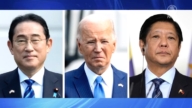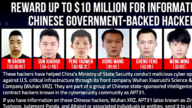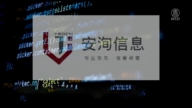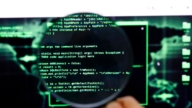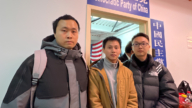【新唐人2014年05月21日讯】19号,美国司法部在新闻发布会上宣布,起诉5名中共军方人员,指控他们入侵美国公司的电脑,盗取商业机密。曾经在中共军中教授电脑的专家,对本台记者表示,中共组织黑客部队,上世纪90年代已经开始。
美国司法部宣布,中共军队“上海61398部队”的5名军人,涉嫌通过网路,入侵美国钢铁、太阳能和核电企业,与一家劳工组织的电脑,窃取机密资料。美国相关部门表示,这些资料有助于中国在一些关键时刻,开展竞争并获得优势。
美国司法部在记者会上证实,被告5人都是61398部队第3支队成员,被告分别是王东(Wang Dong)、孙凯良(Sun Kailiang)文新宇( Wen Xinyu)黄镇宇( Huang Zhenyu)顾春晖( Gu Chunhui)。
被告的罪名包括:意图进行电脑诈骗;入侵电脑系统获取资料图利;传送程式、信号、数码,破坏受到保护的电脑;以及窃取贸易机密等31项指控。
这些黑客还被指控入侵与中国陷入贸易争端,和进行商业谈判的公司,使得中国的国有企业,在与美国公司竞争时占据上风。
这是美国政府首次公开针对美国企业的“黑客罪”,指控外部势力的雇员。
加拿大全球信息自由网创办人张新宇:“九几年,全国的解放军比武,那个时候加了一项计算机的编黑客、编病毒这些东西,我那个时候是教他们,他们强化一下,在全国动用了很多力量去做这个事。”
据香港《苹果日报》报导,“61398部队”,位于上海浦东一幢12层高的建筑物内,附近守卫森严,有军人看守,并贴有告示,列明“军事禁区,不许拍照”。
美国保安公司“Mandiant”花了6年时间,追踪到了这支网路部队,发现这支由中共军队辖下的网路战部队,攻击了141家美国机构和企业。去年的报告曝光后,有西方传媒到现场采访偷拍,被军人阻止。
61398部队,隶属总参谋部三部二局。“总参三部”是一个非常神秘的部门,总部设在北京,而上海、青岛、珠海、哈尔滨和成都等地都驻有机构。职能是负责“讯号情报”,包括监听电子通讯、分析卫星情报、破解密码等。编制估计上万人。
大陆的传媒指称,“总参三部”在全中国大学招揽主修电脑、数学等研究生加入部队,其中二局要求成员熟悉英语,其他局则要求成员熟悉日语、韩语、俄语和西班牙语等外国语言。
“Mandiant”的报告揭发,中共军队黑客利用的900多个服务器当中,有7个位于香港,这些服务器,曾经利用“香港科技大学”的网路,作为攻击和盗取资料的中介服务器。
美国曾经多次指责中共的机关部门,向美国政府和民间企业发动网上袭击。去年,美国一间网路安全公司发表报告曾说,中共成立了“网军部队”,向美国联邦政府和民间企业发动袭击的,绝大部分来自这支部队。
美国司法部长埃里克•霍尔德(Eric Holder)说,鉴于谈判和外交行动,无法制止这些袭击,华盛顿正在采取法律行动。
美国“纽约城市大学”政治学教授夏明指出,最近俄罗斯对乌克兰的入侵,以及南中国海局势,促使美国政府作出这次指控的决定。
美国纽约城市大学政治学教授夏明:“美国在调整它的根本战略,认为我们不能再退让,不能再对他们显示出我们的友善,决定给他们点颜色看,所以在网路战争下手的话,我相信美国会对俄国和中国进行多场战争,还有贸易战争,舆论宣传,甚至货币战争。”
美国总统欧巴马上个月(4月)访问了几个东南亚国家,展现出美国重返亚太的决心。欧巴马表示,尽管美国希望各方通过外交磋商,来解决海上的领土争端,但是美国将履行保护亚太盟国的承诺。
采访编辑/刘惠 后制/钟元
CCP Internet Hacking Forces Established in the 1990’s
On May 19, the U.S. Department of Justice made
an announcement during a news conference.
It will prosecute five Chinese Communist
Party (CCP) military personnel.
It accuses them of invading the computers of
companies in the U.S., to steal business secrets.
A computer expert who used to teach the
CCP military told NTD reporters that CCP
hacker forces already existed in the 1990s.
The U.S. Department of Justice announced that five CCP
soldiers, from the “Shanghai 61398 Troops”, are suspected
of stealing confidential information via internet hacking.
The information was stolen from U.S. Steel, solar and
nuclear power companies, and a labor organization.
Relevant U.S. authorities said that this data will help
China gain advantage in competition at key moments.
The U.S. Department of Justice confirmed
at the press conference that the five defendants
are in the 3rd Brigade of the “61,398 Troop.”
They are Wang Dong, Sun Kailiang,
Wen Xinyu, Huang Zhenyu and Gu Chunhui.
Charges against the defendants include 31 counts, including
intended fraud via computer, intrusions into computer systems
to obtain data for profits, transfer of programs, signal, data to
sabotage protected computers, and stealing business secrets.
The hackers are also accused of invasion into companies
with trade disputes and commercial negotiations with China.
They are thought to have helped China ‘s state-owned
enterprises gain advantage over competing U.S. companies.
This is the first time the U.S. government
has publicly accused foreign sources of
“hacker crimes” in corporate America.
Zhang Xinyu, Canada Global Network Initiative (GNI)
founder: “During a national CCP People’s Liberation
Army (PLA) competition in the 1990s, computer code
hacking and virus encoding was added to the contest.
I taught them to strengthen on this.
They used much effort on this.”
According to HK’s Apple Daily, “61,398 Troops”
are located in a 12-story building in Shanghai.
The area is heavily guarded with soldiers, with a banner
stating: “Military Restricted Area. No Photos Allowed.”
The U.S. security company Mandiant took six years
to track this regiment, and found out that this CCP internet
force has attacked 141 U.S. institutions and enterprises.
After last year’s report was exposed, western media
were blocked by soldiers to visit and access the site.
“61,398 Troop” is under Bureau Two of CCP General
Political Department Three, a mysterious department.
Headquartered in Beijing, it has offices in
Shanghai, Qingdao, Zhuhai, Harbin and Chengdu.
Its function is “signals intelligence”, including listening to
electronic communications, analysis of satellite intelligence,
and decoding encryption, with over 10,000 resources.
Chinese media alleged that General Political Department
Three recruits post-graduate students majoring in
computer science and mathematics to join the ranks.
Bureau Two requires employees to be good at English.
Other bureaus ask for knowledge in Japanese,
Korean, Russian, Spanish and other foreign languages.
Mandiant’s report revealed that among the 900+ servers
the Chinese military uses, seven are hosted in Hong Kong.
These seven servers once used the network of
Hong Kong University of Science and Technology
as an intermediary stage to attack and steal data.
The U.S. has repeatedly accused the CCP of launching
cyber attacks on the U.S. government and private sectors.
One U.S. Internet security firm said in its 2013 report
that the CCP has established Cyber Army forces.
Attacks to the U.S. government and private
sectors were mostly launched by this force.
The U.S. Attorney General Eric Holder said negotiations
and diplomatic actions were not able to stop these attacks.
Washington is taking legal action.
Professor Xia Ming is an expert in political
sciences at City University, New York.
Professor Xia suggests that the recent Russian invasion
of the Ukraine, and the situation in the South China Sea
pushed the U.S. government to act on these allegations.
Professor Xia Ming: “The U.S. is
adjusting its fundamental strategies.
We should no longer compromise
or continue to show friendliness.
We decided to teach them a lesson,
starting with the war in the internet.
I believe the U.S. will launch more wars with Russia
and China over trade, propaganda, and even currency.”
U.S. President Barack Obama visited several
countries in Southeast Asia last month to
show the determination to support Asia.
Obama expressed that although the U.S. wants to resolve
territorial disputes of the sea through diplomatic negotiations,
it will fulfill commitments to protect it’s Asia-Pacific allies.
Interview & Edit/Liu Hui Post-Production/Zhong Yuan


